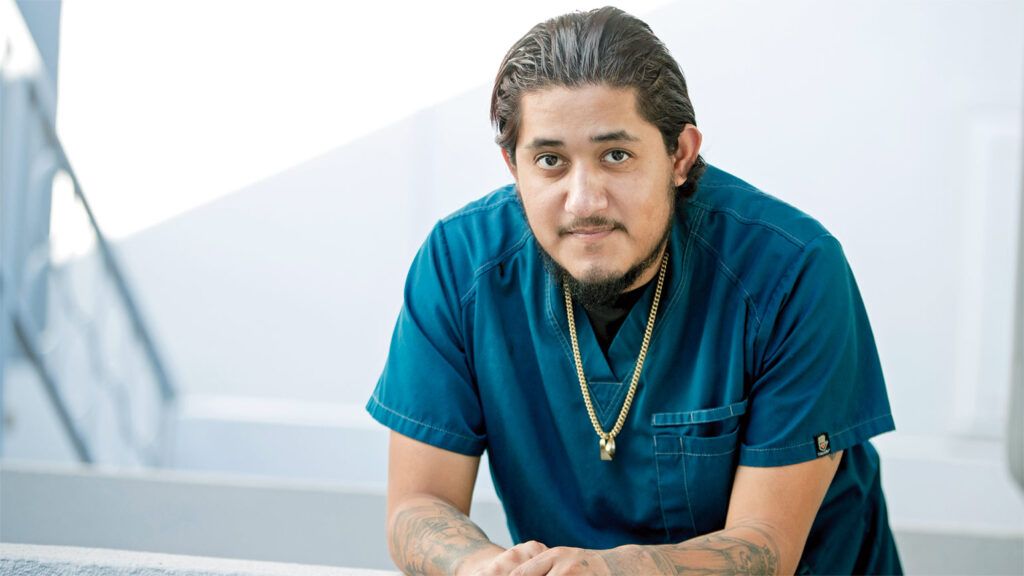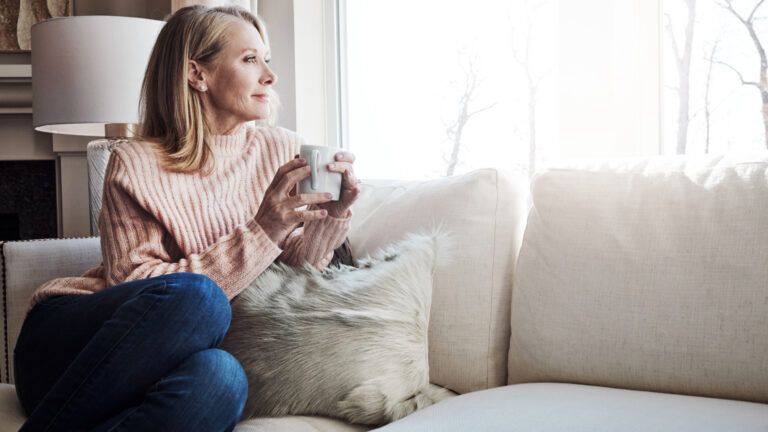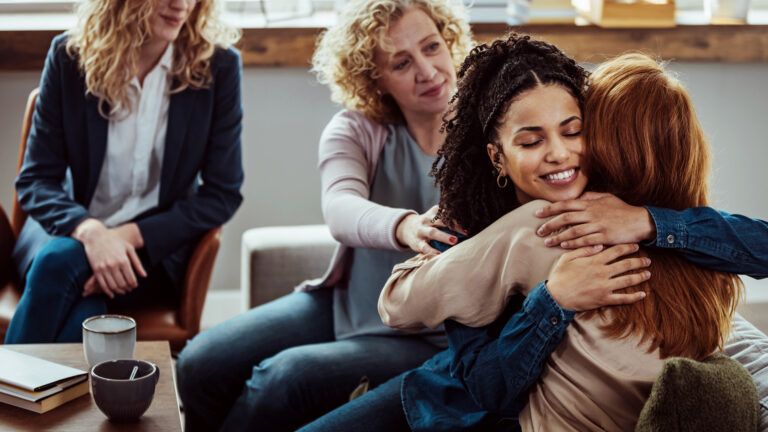I’m a certified nursing assistant caring for patients with Alzheimer’s, dementia and other late-in-life conditions. CNAs, as we’re called, are frontline workers in skilled nursing homes and assisted living facilities. I provide personal care, monitor my patients’ health and help them with everything from acute medical intervention to sneaking into the kitchen after hours to get them a sandwich or a cup of coffee.
Turnover in this job is high. The work is hard, and the pay doesn’t always support a family. Many CNAs, including me, have to work second jobs.
During the Covid pandemic, I cared for as many as 40 patients at a time because other staff members were sick or guidelines limited the amount of person-to-person contact. Many CNAs became overwhelmed and left the profession.
I stayed and am now training to be a licensed vocational nurse, the next step on the way to my goal of becoming a registered nurse. I’ve found a calling in caregiving.
Why did I stick with a job that so many other people find challenging?
Because this job saved my life.
To explain what I mean by that, I need to tell you my story from the very beginning.
I was adopted when I was two and a half years old, along with my four older siblings. My birth mother used drugs, and I have been told there were drugs in my system when I was born.
Either way, my siblings and I were not well cared for during the early years of our lives. We bounced around foster care. By the time I was adopted, I needed speech and physical therapy. I didn’t have contact with my birth mom after age three, and she died of diabetes when I was nine. I don’t know where my father is.
My adoptive mom, Mayra, had gotten a divorce and had older children from that marriage. She worked as a teacher and felt called to continue raising children through adoption or foster parenting.
In preschool, I was diagnosed with learning disabilities, including severe attention-deficit disorder. Even today, I find it hard to sit still or pay attention for a long time. That’s part of why I like being a CNA. I’m on the move all day long.
My mom went all out for her new kids. She got us psychological help and enrolled us in an excellent school in our new neighborhood. She took us to church and kept God at the center of our lives.
She was a big believer in positive reinforcement. “You’re very smart, Christian,” she would say when I struggled at school, especially with reading. “You have a different way of learning. Don’t say bad things about yourself.”
At dinner, we played a game called “I am, you are.” Each person said something positive about themselves, then gave a compliment to someone else at the table.
I admit, sometimes I rolled my eyes at this game. But so many of the other voices in my life were negative: “Christian is dumb—he can’t even read.” “Sit still!” “Go to the principal’s office.” “You are impossible!” It felt good to hear something nice for a change.
Mom was my biggest cheerleader. But let me tell you, I put her faith in me to the test.
One of my toughest problems at school was when other kids put me down. They called me stupid and picked on me relentlessly. I fought back and often got suspended.
When I was around 11, things got even worse.
That year, an opportunity came up for Mom to serve as a lay missionary working with young street dwellers in Bolivia. She thought this would be a wonderful chance for us to experience living in another country and serving the less fortunate.
I went beyond serving those kids on the streets—I joined them. I began roaming with gangs of homeless youths. I drank. Experimented with drugs. Stole. Learned to hotwire cars.
For the first time in my life, I didn’t feel different from other kids. I felt accepted. No one in those gangs called me dumb or cared about my grades or my difficulties with reading.
“Your birth mom used drugs?” one of the kids asked me. “So did mine.”
Despite my mom’s best efforts, I still believed the worst about myself. Why try to be good when I just wasn’t? There was no hope for someone who was born broken like me.
At one point, I even ran away and lived on the streets for a while.
After we finally came home to California, I put my new skills to use on the streets of my neighborhood. I stole, drank and used drugs. I cut school and got in fights. Chased girls.
“God will find a way for you, Christian,” my mom insisted. “A school where you will thrive.”
Mom always said stuff like that. But she made it happen. With the help of the school district, she found a reformatory school in Texas that would keep me away from the streets and surround me with teachers and psychologists skilled at working with struggling kids.
I was furious. Being sent away felt like being abandoned. Mom wrote to me every day, but I never read her letters. I refused to go to church.
Gradually, though, things got better. Teachers at the school knew how to work with my learning style, and I began passing classes. I met another student named Danna and right away fell in love. I knew I wanted to marry her someday.
I wish I could say I was a changed person the moment I finished school in Texas and returned to California. But the self-doubt remained. I assumed I would never get a job that required any more than basic skills.
I returned to my old friends and drifted back into bad behavior. Here and there I worked at warehouses or did other odd jobs. Most of the time, I just partied.
Two years after our graduation, Danna and I got married. I was 20 years old. The year after that, we welcomed a son and named him Luka.
One day, when Luka was six months old, he began wheezing and gasping for breath. I was terrified. At the hospital, he was diagnosed with severe bronchiolitis and tonsillitis.
I kept a vigil by his hospital bed. His tiny body was surrounded by tubes and machines. In a life filled with bad choices and self-condemnation, I had done one thing right—this little boy. I did not want to lose him.
I watched his chest rise and fall as he struggled to breathe. His life was precious. And I was gambling with it by throwing away my own life. Just like me before I was adopted, this boy needed a stable family.
I won’t let my son down, I vowed. I remembered all the times I had gotten on my knees to pray with Mom in church. Most of my life, I was angry at God. Now I got on my knees beside Luka’s bed.
“Help my son live,” I whispered.
Days later, Luka fought off the infection and came home. I needed a job—fast.
A friend of Danna’s mentioned a job opportunity she’d heard about at a convalescent hospital. “They’ll even help cover the cost of a certification class,” she said.
Before Luka, I would have said no because you had to pass a test.
“Where do I apply?” I said.
I never had to take that written test. I passed the first part of certification—on-the-job performance—with high honors. Before I could take the written part, the pandemic hit and the hospital got desperate for staff. It hired me as an assistant CNA. Later, with experience gained on the job, I passed the written test.
I was so proud!
The pandemic was a baptism by fire. I was worn out every day. It was hard witnessing so much suffering and loss. Sometimes I wondered whether I had made the right choice.
But then I would get to know someone like Sarah, an elderly lady who loved to paint and could always be found with a canvas on the patio. Like many of my patients, she thought of me as a good son who came to visit her often. Before she died, she gave me one of her paintings, a pretty picture of a vase. I still have it and cherish it.
There was Patrick, a grumpy guy who took a liking to me. “Hey, Christian,” he’d whisper. “How about you go in the kitchen and get me a sandwich?”
“I think the kitchen’s closed, Patrick.”
“I’ll cover for you.”
“For you, Patrick, I’ll do it.”
I identify with my patients. Our society doesn’t have much time for elders. Many patients in nursing homes feel cast aside. When I talk to them about their lives, they are grateful that someone cares about them.
“I missed you,” they say when I come to work in the morning.
“I missed you too,” I say.
I call my patients RSPs: respected special persons.
It took me a long time to see myself as an RSP too. My mom knew it when she adopted me. Danna knew when we got married. Luka knows it every day when I do all the things I wish my father had done with me. My patients know it when I care for them.
God always knew. With this calling and this wonderful family he prepared for me, he opened my eyes to it too.
For more inspiring stories, subscribe to Guideposts magazine.




